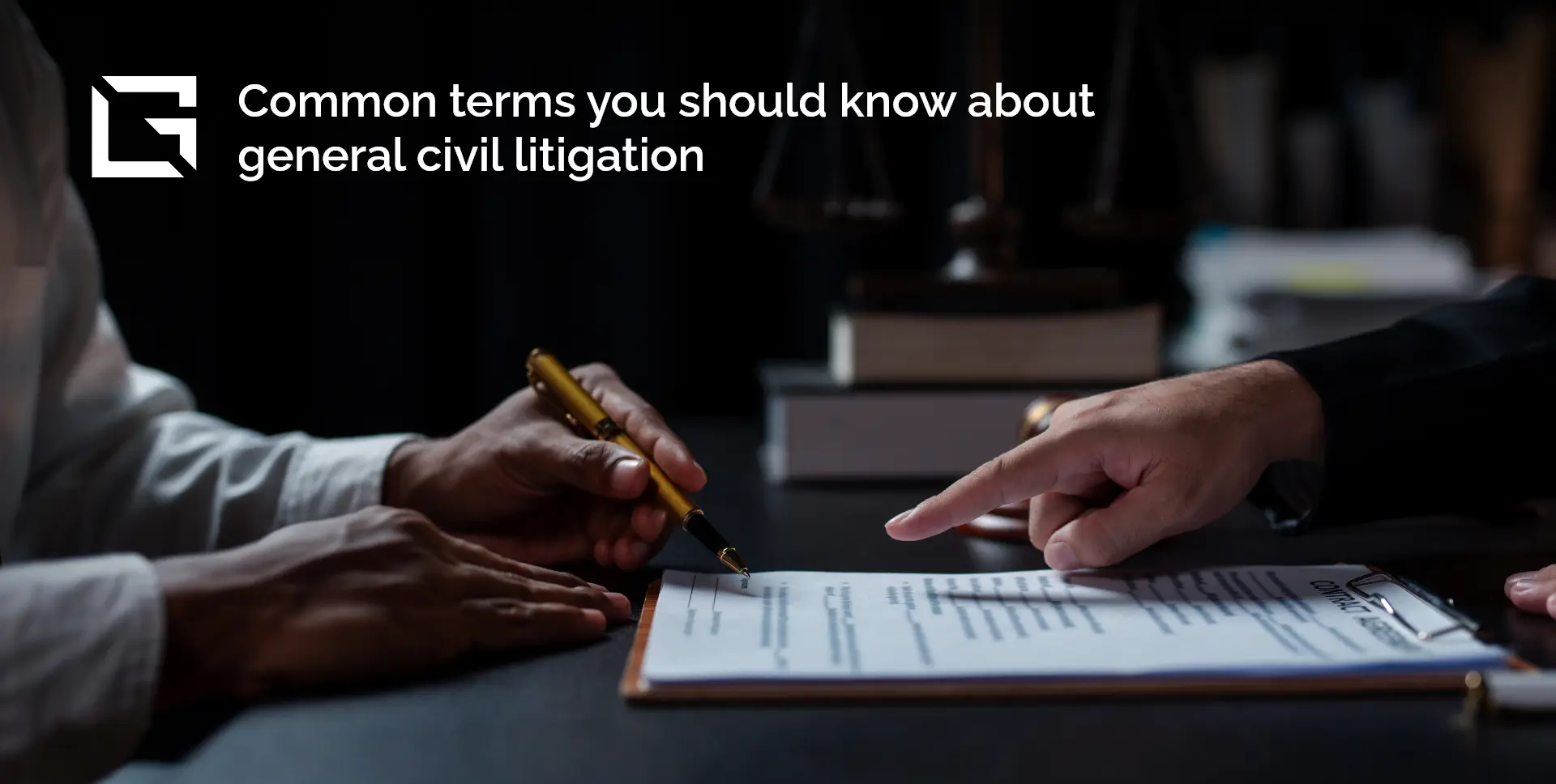The legal system can feel like a labyrinth of unfamiliar terms and complex procedures. If you’re facing a civil lawsuit, understanding the basic language used in court can empower you to participate more effectively. This guide from Gibb Law Firm focuses on common legal terms encountered in general civil litigation so you can understand the practice areas with greater clarity.
The Players:
- Plaintiff: The individual or entity bringing the lawsuit, claiming they have been wronged by the defendant.
- Defendant: The individual or entity against whom the lawsuit is filed.
- Judge: The presiding official in the courtroom who oversees the proceedings and makes legal rulings.
- Jury: A group of citizens selected to hear the evidence and render a verdict based on the law and the facts presented.
The Process:
- Complaint: A legal document filed by the plaintiff that outlines the lawsuit’s basis, including the alleged wrong and the desired outcome.
- Answer: The defendant’s formal response to the complaint, may deny the allegations or raise legal defenses.
- Discovery: A phase where both parties exchange information and evidence relevant to the case, such as documents, witness statements, and expert reports. This phase can be crucial for uncovering facts and building a strong case.
- Motions: Formal requests made by either party to the judge on various legal issues. For instance, a motion to dismiss might argue that the lawsuit lacks merit, while a motion to compel seeks to force the other party to produce withheld evidence.
- Probable Cause: While more commonly associated with criminal law, the concept of probable cause can also apply in civil litigation contexts, such as when seeking a warrant for a search relevant to the civil case. It refers to the reasonable belief that a party has committed a civil wrong or violation.
- Trial: The formal presentation of evidence and arguments before the judge or jury. The plaintiff presents their case first (opening statement), followed by the defendant. Each party has the opportunity to call witnesses, introduce exhibits, and cross-examine the other side’s witnesses.
- Verdict: The jury’s decision on the factual issues presented in the case. In some cases, the judge may decide the case without a jury (bench trial). If a jury is involved, they must reach a unanimous verdict in most civil cases to find for the plaintiff or defendant.
- Judgment: The court’s final order is based on the verdict or the judge’s decision. This order may award damages to the plaintiff, require the defendant to take specific actions, or dismiss the case entirely.
- Appeal: A request to a higher court to review the lower court’s decision on legal errors. Appeals can be based on arguments that the judge incorrectly applied the law, excluded relevant evidence, or issued faulty instructions to the jury.
- Reasonable Doubt: This term is essential in criminal cases but less so in civil litigation, where the standard of proof is typically “preponderance of the evidence” (more likely than not) rather than “beyond a reasonable doubt.”
- Case Law: refers to the set of previous judicial decisions that guide courts in handling current cases. These precedents are central to the common law system and provide a framework for interpreting statutes and making legal decisions.
Important Distinctions:
- Civil vs. Criminal Cases: Civil lawsuits involve disputes between individuals or entities, seeking remedies like financial compensation or specific actions (e.g., enforcing a contract). Criminal cases involve the government prosecuting an individual for a crime, seeking punishment (e.g., jail time, fines). The burden of proof and standard of evidence also differ.
- Burden of Proof: The plaintiff has the burden of proof in civil cases, meaning they must present evidence to convince the judge or jury that their claims are more likely true than not (preponderance of the evidence). The burden of proof in criminal cases lies with the prosecution, who must prove the defendant’s guilt beyond a reasonable doubt, a much higher standard.
- Bankruptcy Cases and Appeals: Bankruptcy litigation is a specialized area of civil litigation dealing with laws surrounding financial insolvency. Appeals in bankruptcy cases, as in other civil litigations, involve a higher court reviewing the decision of a lower court.
- Hung Jury and Mistrial: A hung jury occurs when the jurors cannot agree on a verdict, potentially leading to a mistrial. A mistrial means the trial is invalid due to fundamental error or deadlock, after which the case might be retried with a new jury.
- Trial Jury vs. Federal Civil Juries: In civil litigation, a trial jury, also known as a petit jury, decides on the facts of the case. Federal civil juries operate under slightly different rules and procedures compared to state juries but serve the same fundamental role in deciding cases based on the evidence presented.
Beyond the Basics:
This is just a glimpse into the world of general civil litigation and its legal terms. Several other important concepts can come into play depending on the specific case, including:
- Jurisdiction: The legal authority of a court to hear a case.
- Statute of Limitations: The deadline for filing a lawsuit after an alleged wrong occurs.
- Damages: The monetary compensation awarded to a plaintiff for losses suffered due to the defendant’s actions.
- Settlement: An agreement reached between the parties outside of court to resolve the lawsuit.
Every case is unique. If you’re involved in a civil lawsuit, consult with Gibb Law Firm so we can explain the specific legal terms and procedures relevant to your case, develop a legal strategy tailored to your goals, and protect your rights throughout the process. Gibb Law Firm is here to guide you through the complexities of civil litigation. Contact us today for a consultation.
Contact information
Gibb Law Firm
Phone – (801) 725-6035
Address – 610 N. Kays Dr., Suite 109 Kaysville, Utah
Disclaimer: This blog is for informational purposes only and is not legal advice. Please contact us to discuss the specifics of your litigation situation.


